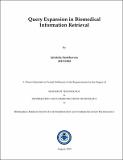Please use this identifier to cite or link to this item:
http://drsr.daiict.ac.in//handle/123456789/538| Title: | Query expansion in biomedical information retrieval |
| Authors: | Majumder, Prasenjit Sankhavara, Jainisha |
| Keywords: | Biomedical Information Retrieval Biomedical Document Life Science Medical UMLS Metathesaurus |
| Issue Date: | 2015 |
| Publisher: | Dhirubhai Ambani Institute of Information and Communication Technology |
| Citation: | Sankhavara, Jainisha (2015). Query expansion in biomedical information retrieval. Dhirubhai Ambani Institute of Information and Communication Technology, viii, 42 p. (Acc.No: T00501) |
| Abstract: | Retrieving relevant information from biomedical documents is a new challenging task. Health related articles from the literature of biomedical and life sciences are a good source of knowledge for searching information relevant to a patient’s medical case report. Medical case reports describe patients’ medical condition i.e. medical history, current symptoms, tests performed, undergoing treatments etc. The articles related to medical case reports can be useful for clinicians to best care their patients. For example, a successful treatment described in an article for patients of a particular age group, having particular medical history and symptoms might be advisory to the patients having similar medical case report. This thesis focuses on applying query expansion techniques and fusing them for biomedical domain, especially while retrieving biomedical articles from the literature relevant to a particular case report. Along with the traditional query expansion techniques, query expansion using external medical knowledge is also carried out and compared with the state-of-the-art query expansion technique i.e. Incremental Blind Feedback. For the external knowledge source, UMLS Metathesaurus is used which is a network of medical related concepts. Text REtrieval Conference provided the data for this research as a part of Clinical Decision Support track in 2014 for which results of traditional query expansion techniques and fusion with manual feedback are reported. The fusion run gives consistent results for considered evaluation metrics. The results of Incremental Blind Feedback technique are comparable to the best of TREC CDS-2014. While considering the type of queries, the queries of type ’diagnosis’ and ’treatment’ performed better than that of ’test’. |
| URI: | http://drsr.daiict.ac.in/handle/123456789/538 |
| Appears in Collections: | M Tech Dissertations |
Files in This Item:
| File | Description | Size | Format | |
|---|---|---|---|---|
| 201311002.pdf Restricted Access | 460.8 kB | Adobe PDF |  View/Open Request a copy |
Items in DSpace are protected by copyright, with all rights reserved, unless otherwise indicated.
